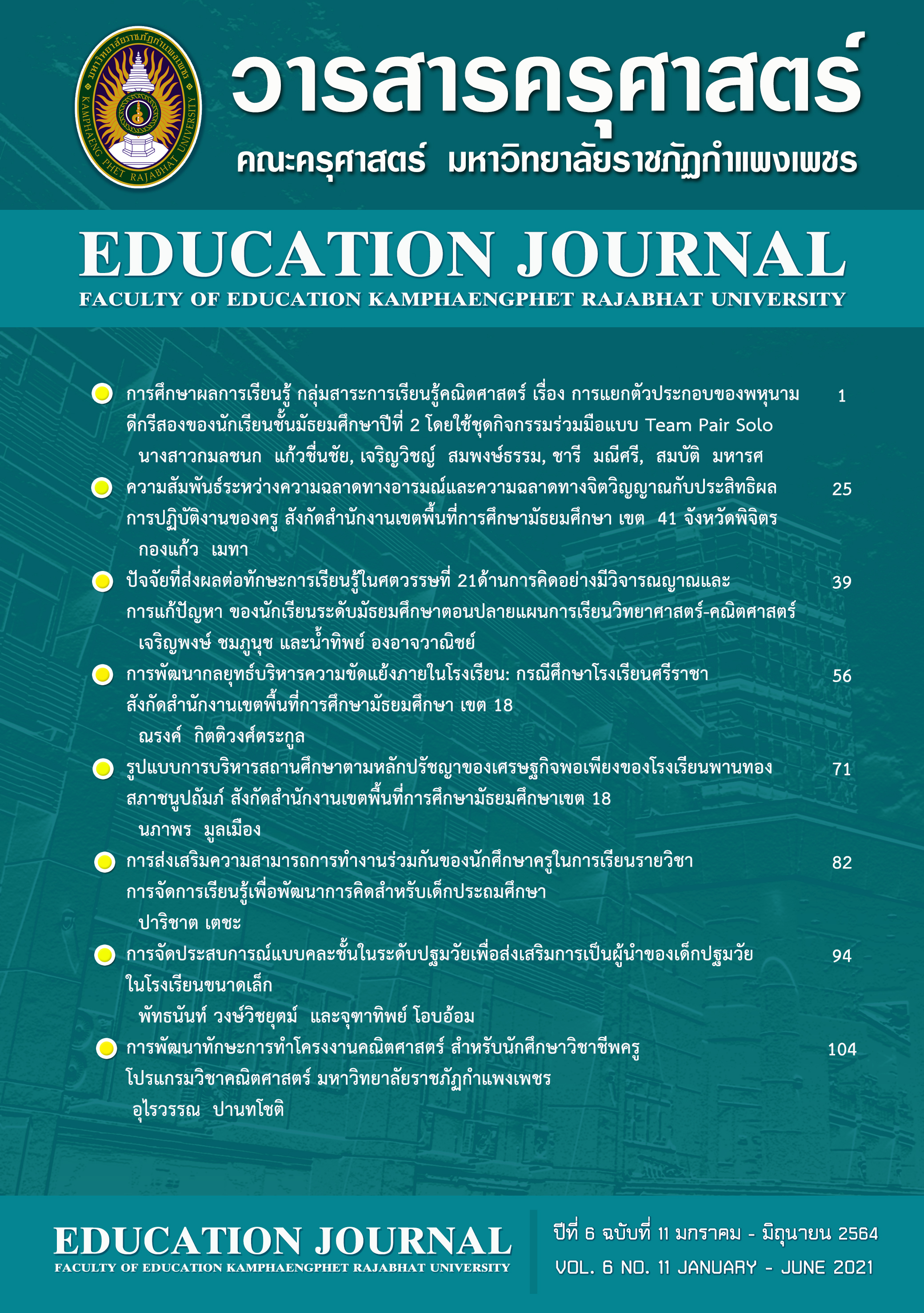THE FACTORS AFFECTING LEARNING SKILLS IN 21st CENTURY CRITICAL THINKING AND PROBLEM SOLVING FOR HIGH SCHOOL IN SCIENCE-MATHEMATICS LEARNING PLAN
Main Article Content
Abstract
The purpose of this research were 1) To study the correlation between the predictor variables and the criterion variable: learning skills in the 21st century critical thinking and problem solving of high school in science-mathematics learning plan 2) To find the best predictor variables and create prediction equations the effect on learning skills in the 21st century critical thinking and problem solving of high school in science-mathematics learning plan. The sample were 34 students studying in Latyaowitthayakom School in science-math learning plan obtained by means of sample random sampling. The data gathering instrument was questionnaire. The data was analysed by mean score, standard deviation, the Peason 'Product Moment Correlation Coefficient and Multiple Regression Analysis used to find the best factor to formulate the discriminating equation in the forms of raw score and standard score.
The findings revealed the values of Correlation Coefficient with in the factor affecting learning skills in the 21st century critical thinking and problem solving of high school in science-mathematics learning plan were all positively Correlated. There is a positive relationship. The statistical significance was at the level of .01 of 10 values with a positive correlation coefficient between .216 and .681. The double predictive variable with the highest correlation coefficient was the reasoning ability and the perception of self Multiple regression analysis found that the best predictive variables affecting 21st century learning skills in critical thinking and problem solving of upper secondary school students Science-Mathematics Learning Plan Statistical significance at the level of .01 is 4 variables which are self-efficacy reasoning ability attitudes towards learning and achievement motivation respectively. You can write the forecasting equation Y in raw scores and standard scores as follows
Article Details

This work is licensed under a Creative Commons Attribution-NonCommercial 4.0 International License.
CC Attribution-NonCommercial-NoDerivatives 4.0
References
กระทรวงศึกษาธิการ. (2560). มาตรฐานการเรียนรู้และตัวชี้วัด กลุ่มสาระการเรียนรู้คณิตศาสตร์ วิทยาศาสตร์และสาระภูมิศาสตร์ ในกลุ่มสาระการเรียนรู้สังคมศึกษา ศาสนา และวัฒนธรรม (ฉบับปรับปรุง พ.ศ. 2560) ตามหลักสูตรแกนกลางการศึกษาขั้นพื้นฐาน พุทธศักราช 2551. กรุงเทพฯ.
กัลยาพร จงภัทรทรัพย์. (2558). โมเดลเชิงสาเหตุของความสามารถการคิดวิเคราะห์ของนักเรียนชั้นมัธยมศึกษาปีที่ 6 สำนักงานเขตพื้นที่การศึกษาประถมศึกษาพิษณุโลก เขต 1. ปริญญานิพนธ์ ค.ม., มหาวิทยาลัยราชภัฏพิบูลสงคราม, พิษณุโลก.
จิราภรณ์ เรืองยิ่ง. (2557). ปัจจัยเชิงสาเหตุของความเชื่ออำนาจภายในตนที่สิ่งผลต่อความสามารถในการคิดอย่างวิจารณญาณของนักเรียนชั้นมัธยมศึกษาตอนต้น ในโรงเรียนสังกัดสำนักงานเขตพื้นที่การศึกษามัธยมศึกษา เขต 16. ปริญญานิพนธ์ กศ.ม.,มหาวิทยาลัยหาดใหญ่, สงขลา.
จุฑามาศ กันทา. (2557). ปัจจัยที่ส่งผลต่อความสามารถในการแก้โจทย์ปัญหาคณิตศาสตร์ของนักเรียนชั้นประถมศึกษาปีที่ 6 จังหวัดพิจิตร. วารสารวิชาการเครือข่ายบัณฑิตศึกษามหาวิทยาลัยราชภัฏภาคเหนือ, 4(6), 41-56.
ฐิติยา วงศ์วิทยากูล. (2555). ปัจจัยเชิงสาเหตุที่ส่งผลต่อความสามารถในการแก้โจทย์ปัญหาคณิตศาสตร์ของนักเรียนชั้นประถมศึกษาปีที่ 6. วารสารการวัดผลการศึกษา มหาวิทยาลัยมหาสารคาม, 17(1), 163-173.
ดวงพร บูรณะพงศ์. (2555). ปัจจัยที่ส่งผลต่อความสามารถในการคิดอย่างมีวิจารณญาณของนักเรียนชั้นมัธยมศึกษาปีที่ 4 โรงเรียนชลราษฎรอำรุง. สืบค้นเมื่อ 3 มกราคม 2563. จากhttp://www.cru.ac.th/cru_web/Career%20and%20Technology/www_ cru/shared.php.
สำนักงานคณะกรรมการพัฒนาการเศรษฐกิจและสังคมแห่งชาติ. (2560). แผนพัฒนาเศรษฐกิจและสังคมแห่งชาติ ฉบับที่ 12 (พ.ศ.2560 - 2564). กรุงเทพฯ.
วารุนันท์ รินลา. (2552). ปัจจัยที่มีอิทธิพลต่อความสามารถในการแก้ปัญหาทางวิทยาศาสตร์ ของนักเรียนชั้นมัธยมศึกษาปีที่ 2 สังกัดสำนักงานเขตพื้นที่การศึกษาชัยภูมิ เขต 2.ปริญญานิพนธ์ กศ.ม., มหาวิทยาลัยมหาสารคาม, มหาสารคาม.
สุกัญญา มณีนิล. (2552). ปัจจัยเชิงสาเหตุที่มีอิทธิพลต่อการคิดอย่างมีวิจารณญาณของนักเรียนที่มีรูปแบบการเรียนแตกต่างกัน. ปริญญานิพนธ์ กศ.ม., มหาวิทยาลัยมหาสารคาม, มหาสารคาม.
Kay, K. & Greenhill, V. (2011). Twenty-First Century Students Need 21st Century Skills. In Wan, G.& Gut, D. M. (Eds.). Bringing Schools into the 21st century. New York: Springer.


